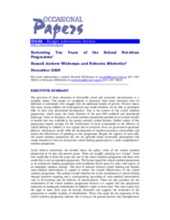The South African School Nutrition Programme was established in 1994 to address the food needs of impoverished school children. However, researchers are divided about the policy value of the school nutrition programme, with one group wishing to expand the programme whilst the other advocates limiting its scope. This paper argues that the lack of balance between school feeding and other nutritional considerations de-legitimises the programme’s narrow targeting and strengthens arguments for the expansion of the school nutrition programme.
The paper tells the historical story of the school nutrition programme, documenting the distinct public financing regimes as well as explaining the definitive programme-governance related periods. With regard to reviewing the efficiency and effectiveness of spending on the school nutrition programme, it finds that:
- under the supervision of the Department of Health, the school nutrition programme was subjected to real declines since its inception. The declines reflect poor funding prioritisation of a very important public policy
- highly variable and inefficient actual spending patterns characterised the programme until around 2001. This directly reduced the overall effectiveness of the programme in serving poor learner communities
- the absolute number of participating schools declined 15.4 percent over the period 1995-2004, and the participation of school children dropped by 29 percent over the same period
- high expenditure ratios in 2004/05 appear to reflect growth in beneficiary numbers, which is partly the result of inherited targeting inefficiencies and partly due to revisions to inherited databases by provincial education departments
- differences in targeting practices between education and health prior to 2004/05 caused the same primary school to be treated differently by health and education poverty targeting strategies. This weakened the overall impact of spending and reflected poor interdepartmental communication and co-operation.
Although the programme is now expected to achieve real and positive growth in the coming years, the authors find that challenges concerning the implementation of the school nutrition programme remain. These are:
- the lack of a clear affirmation that the school nutrition programme is an anti-poverty measure. This will require clear policy and practical guidelines for identifying beneficiaries
- in the absence of re-designed legislation in the area of school funding norms, efforts at developing a full-blown anti-poverty school nutrition programme will be frustrated
- communities need to be a given a greater stake in the delivery of healthy food. This enhances the budgetary value of the school nutrition programme, but more importantly builds nutrition-conscious communities.
©Institute for Democracy in South Africa (IDASA)

